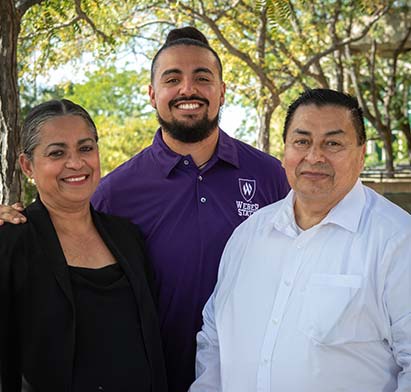Cristian Gutierrez BS ’19 recalls his father’s joy during a special graduation ceremony in April. Weber State’s Office of Access & Diversity and the student chapter of MEChA hosted the inaugural Latinx/Raza Graduation Ceremony, celebrating the achievements of Latinx members of the Class of 2019. Out of the 50 students who took part, most, including Gutierrez, were the first in their families to earn a college degree.
Enrique Romo, WSU’s assistant vice president for Student Affairs, was the event’s keynote speaker, sharing his experiences of pursuing a Ph.D. despite feeling disenfranchised as a Latino growing up in Texas. Romo and other speakers intentionally switched between English and Spanish during the ceremony, according to Gutierrez, since many parents were listening in Spanish and many students were only fluent in English.
“My dad has never been able to fully appreciate graduation ceremonies,” Gutierrez said. “He’ll pick up a word or two, but only takes in 10 to 20% of the ceremony.” However, that wasn’t the case at the spring ceremony.
“My father walked away from this event rejoicing. He felt like the ceremony was meant for him,” said Gutierrez, who grew up in Ogden after his parents emigrated from El Salvador. “There is only one commencement. Attempting to translate the commencement to one language is a daunting task, let alone translating to every language spoken on our campus,” Gutierrez said, noting he’s had classmates from Korea, China and Saudi Arabia. “That’s what makes this ceremony so important. It was a moment for people to come together and take part in an event with cultural roots.”
The ceremony included traditional folk dancers from Mexico and Bolivia, student speakers from Mexico and Panama, as well as Brazilian influences. “When you are a first-generation Latinx student, these things are important. That’s my blood, my people, my culture,” said Gutierrez, who helped plan the event.
Each graduate was given 30 seconds to say a few words. Some thanked event organizers. Others used the opportunity to encourage their children to follow in their footsteps and earn a college diploma. Based on the inaugural success, organizers plan for the event to become an annual tradition, with more students participating.
Gutierrez acknowledges that people grow as part of the college experience. He arrived at WSU with an academic scholarship, intending to become an engineer. Along the way, he worked for Boys and Girls Club of Weber-Davis and discovered his passion for helping youth.
Having earned his bachelor’s degree in criminal justice, Gutierrez is deciding whether he wants to work with incarcerated youth or as a high school counselor. He is considering getting a master’s degree in counseling. In the meantime, he is assisting first-generation DACA and undocumented youth with how to pursue higher education.
“Everyone says they want to change the world,” Gutierrez said. “I think people confuse that thought with having to do something globally, but you can change the world in your own backyard.”




